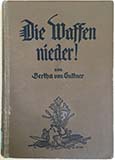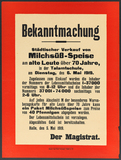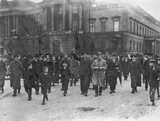1. War in the Classroom
At the beginning of the war, only relatively few directives were issued by the Ministry of Culture demanding an adjustment of the curriculum to include the war. Nor was it necessary. Like the numerous intellectuals and artists, many teachers also committed themselves to the matter at hand and began to take teaching material from the war. Instructions from the authorities only began to appear increasingly from 1916, outlining how the war should be treated at school.
Airborne Flyer Propaganda at the Front
At the beginning of the war, propaganda had very little reach or effectiveness at the front. The flyers were packed in tins, which were weighed down with stones and dropped into enemy trenches.
Anti-war literature
Pacifism in difficult times Nowadays, Erich Maria Remarque’s novel Im Westen nichts Neues (All Quiet on the Western Front) is seen as the most important anti-war novel ever written in the German language. However, there was a German-language bestseller about the horrors of war long before World War I broke out.
Association of German War Collections (VdKS)
The cooperation between the war collections and the military authorities became increasingly difficult in 1915/16, after the edict issued by the Prussian War Ministry on 20 July 1916, forbidding the authorities from passing on any war materials to civilian institutions. Because all war-related written materials now had to be submitted to the newly-created Sichtungsstelle für Kriegsbeute und Bibliothekswesen in the Army General Staff, the collections were consoled by the prospect of gaining acquisitions at the end of the war.
Bugra 1914
The International Exhibition for the Book Trade and Graphic Design (Internationale Ausstellung für Buchgewerbe und Graphik in Leipzig, Bugra), which opened in May 1914, created a special section in October, displaying book-related and graphic products that emerged from the war: books, pamphlets, posters, special editions, illustrated sheets, placards, maps of battlegrounds, drawings, soldiers’ letters, etc.
Collection spectrum
The first preparatory steps for the war collection of the Deutsche Bücherei were taken in September 1914. Germany and France had mobilised and Great Britain had declared war on Germany.
Daily life after the war
Contrary to what many hoped for, the economic situation only improved haltingly after the war. The command economy was initially upheld: food was still rationed (or was only available on the black market).
End of the war and the November Revolution
Two million fallen soldiers, roughly one million civilian casualties and the surrender of more than one seventh of the national territory were the outcome of the lost First World War for the German Reich. Even the abdication of the aristocratic leaders was not enough to prevent the rise of parliamentarisation, which was quickly resolved in October 1918.
Everyday Life at the Front
Life beyond the events of battle was dominated by monotony and boredom. For many men, sleep and exchanging letters with home were the most important ways of spending time whenever the noise of war went silent for a few days.
Food and raw material supply
Due to the reorientation of industrial production towards the manufacture of war goods, the blockade of food imports and mistakes in food distribution, hunger became a serious problem for much of the civilian population, particularly in the second half of the war. The nutritional situation was especially dramatic in the Austrian-Hungarian Empire and the German Reich, which had prepared poorly for a longer-term supply to the population.











